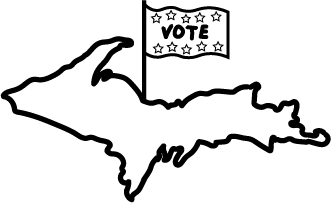In favor, by Riley Garland
Last week, a column was published arguing against voting in the 2020 election. Such a proposition, though at odds with conventional values, is an identification of a real issue that our unwise tendencies toward central planning have created.
Back when the biggest debate in the federal government was over an excise tax on whiskey, voters had a much more constrained scope of policy decisions to consider. They were therefore able to easily direct their government through voting. That’s the benefit of a limited government: it doesn’t require much specialization to understand what’s at stake.
Unfortunately, ideologies promoting central planning and otherwise inefficient methods of organization continue to make headway. Human needs end up being exploited by narcissists in power who are willing to trade foolish utopian promises for votes, whether deliberately or through delusion. These statists have extended our government’s reach far beyond where it was intended, and have managed to grow our government faster than our democratic ability to manage it.
What sort of research and testing requirements for pharmaceutical companies most efficiently bring new drugs to market without increasing the net cost to human health? The average voter doesn’t know, nor the average politician. As economist F.A. Hayek argues in “Road to Serfdom,” as more and more is left to technical experts within agencies to arbitrarily determine, our elected representatives become little more than overpaid theatre actors. While the central planners insist that we should all continue to vote, perhaps it’s only to the extent that they can depend on us ignorant masses to continue propelling their foolhardy and dangerous ideas forward. The truth is that the more planning we put in the government’s hands, the more control that leaves ours.
Voting doesn’t work today: we broke it. In fact, we traded it away for a dream that will never be delivered. Perhaps in a world with a smaller government I would feel compelled to have my say, but in this infinitely complex and technical system the planners have created, truly, who thinks they should have a say anymore?
Riley Garland is a junior, economics major.
In opposition, by Greg Mihalopoulos
In response to a past article by DeForest Dalbec in The North Wind last week titled, “consider the ignorance behind voting” don’t remain passive just because you think you don’t know enough. No-one knows much at all, and that’s why I giggled like a madman when an octopus successfully predicted the results of the World Cup. By remaining passive and accepting our limitations (as they have been described to us) we allow ourselves to become static. Follow your moral compass. It seems harder and harder to find these days, but I swear it’s there. It’s the same little voice in your head that they try to beat out of you in business class. Reform doesn’t have to be vast or sweeping every time. It can be just a quick thought on how we can do/be better. Don’t let the rhetoric alienate you from your self-agency. A healthy republic cannot exist without active citizens.
So far, there has been nothing unique about 21st century culture other than a wave of revamped and improved police states. We see this all around the world, from China’s terrifyingly efficient social engineering to Judge Dredd-esque police activity in the Philippines. Everything that we consider important culture in our society came before the turn of the millennium. In film: Star
Wars, Bad Boys and Jumangi remakes dominate the box office. Retro and vintage fashion is very influential, and I’ve heard the mullet is coming back. The internet has become easily accessible to the average citizen, but the dot-com bubble predates most of this publications’ readers. Music seems to be the only medium to continuously innovate, but I am also the type of person that listens to barely palatable industrial sounds and calls it genius.
If we really want to do something different in the 21st century, we need to reconsider this country that we are inheriting. One cannot do this if they consciously remove themselves from the very process giving them the easiest way to make a positive impact on their fellow citizens: voting. I say we should sue for peace in our wars against drugs and terrorism and turn our sights on the true enemy of the American people: our own apathy. It will be the single fastest cause for the collapse of American dominance before any bomb or needle. In summary, it doesn’t take a room full of Ph.D.’s to screw in a lightbulb. Imagine how many Einsteins died on a plantation or in a sweatshop without having their voices heard. Don’t give up your rights. Definitely don’t throw away your vote just because you don’t know the intricate details of every candidates’ policy on fishing quotas. We live in the “greatest country in the history of the world” but almost a majority of the population seems to think that their voice doesn’t matter, and refuses to participate in the same democratic processes that we put on a pedestal and celebrate in all parts of our society. Does it matter if this state of affairs was intentional or not?
Greg Mihalopoulos is a sophomore, political science major.























